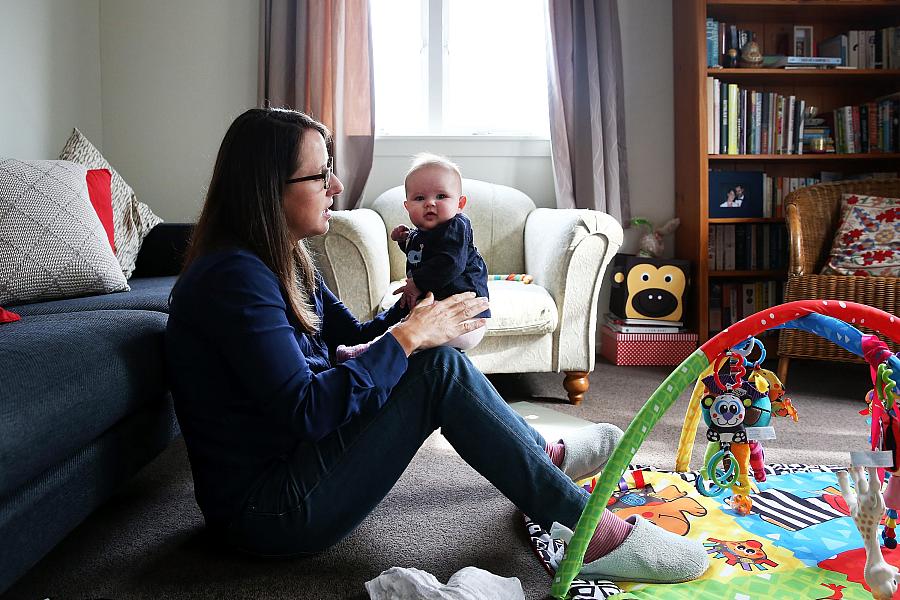Republicans shape agenda, but that doesn’t mean paid family leave is off the table

Photo: Fiona Goodall/Getty Images
On Tuesday, Washington, D.C. lawmakers approved a bill that would give workers eight weeks of family leave after the birth of a child.
But Congress had nothing to do with it. The bill, called “one of the nation’s most general paid family leave programs” by the Associated Press, was passed by the local D.C. Council and now heads to the mayor’s desk.
“Especially in the era of Donald Trump, I think that the only way to make progress on policies that are going to benefit working families is going to be at the state and local level,” Council member Elissa Silverman told AP’s Ben Nuckols.
Except that may not be altogether true. Despite the now-doubtful future of the Democrat’s Family And Medical Insurance Leave (FAMILY) Act, Congressional legislators on both sides of the aisle appear significantly closer than they’ve been in years to taking up paid leave.
In September, Trump bucked the GOP line by outlining his version of a family leave policy: Six weeks of paid leave for new mothers not already covered by their employers. The campaign said the plan would be financed “by eliminating fraud in the unemployment insurance program,” as The Washington Post reported.
Ivanka Trump’s widely-reported influence over her father on this issue seems crucial here, especially considering that a 2004 interview found Trump calling pregnancy “an inconvenience for a person that is running a business.”
“It is the first time that a Republican talked about paid leave in a general election, and put forward a plan, even if it was a flawed plan,” Vicki Shabo, vice president of the National Partnership for Women & Families, told Quartz.
The plan Trump outlined in September doesn’t include fathers, and doesn’t call for full pay. Instead, women would receive unemployment benefits, which are funded via state taxes on employers and administered by the federal government. Mark Gimein detailed the expected benefits in a critical post at The New Yorker:
The payments generally come out to roughly half of the employees’ pay, to a maximum that ranges from $235 a week in Mississippi to $698 a week in Massachusetts. In other words, the total benefit, distributed over six weeks, is no more than $1,410 to $4,188.
(By way of comparison, Hillary Clinton’s plan called for 12 weeks of parental leave at two-thirds regular pay, funded by a payroll tax increase.)
It’s hard to write about family leave in the U.S. without mentioning an almost universally cited fact: The U.S. is the only industrialized nation that doesn’t require paid leave for new parents. European countries provide 14 to 20 weeks of maternity leave, at 70 to 100 percent of regular pay. In 1993, the U.S. enacted the Family and Medical Leave Act, which allows parents to take off 12 weeks of protected leave, but it only applies to companies with at least 50 employees and requires no pay.
Some of the benefits of paid leave are obvious. New parents are at least partly shielded from the financial hit that otherwise comes with taking time off work, moms are given time to fully recover from giving birth, and parents are assured that their job still awaits them upon their return. Paid maternity leave also makes it easier for new moms to breastfeed, which carries well-known health benefits.
Other advantages of paid leave may be less obvious and harder to measure. Over the past decade, an emerging body of research has emphasized how critically important parent-child interactions are in the first months and years of life, particularly when it comes to brain development and language acquisition. A baby’s budding brain is an explosion of new neural circuits, and that growth is fueled by innumerable small interactions with a loving parent, researchers say. Very early interactions matter: We now know that lasting differences in language processing speed are evident in children only 18 months old.
Whether Trump’s six-week plan is enough to make a real difference in these issues is an open question. And then there’s the even more fundamental question family leave proponents must face: Was the plan announced by the President-elect in September a fleeting campaign pledge or a durable issue that will be kept on the administration’s agenda by a uniquely influential First Daughter?
“If he structures it in a way that it’s not a burden on businesses and does not work against women’s work force participation, I think more Republicans will get behind it,” the American Enterprise Institute’s Aparna Mathur told The New York Times last week.
We’ll have to wait and see where family leave lands on a policy agenda dominated by far larger policy battles, such as the repeal of the Affordable Care Act. But while these are hardly welcoming times for anything resembling a new entitlement program, the country’s lack of a paid family leave law would be an instance of American exceptionalism worth ending.
**
Related posts
Election result could have major implications for children’s coverage

